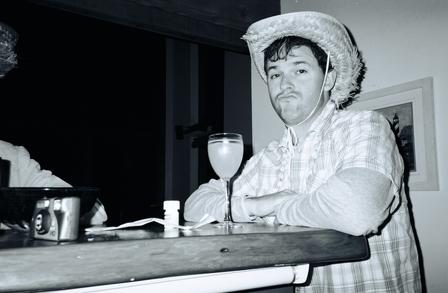Consider the Blackbird Scientist
Stress is an undeniable part of living in the modern world. To differing degrees, all humans feel stress--and we all cope with it on a daily basis. Our coping mechanisms can include yoga, alcohol and various prescription medications, among other things. How we handle stress can help to shape our well-being--so it's important to find out exactly what calms you.
There was an article I read several weeks back about the European Blackbird, and how the urban contingent of this species actually responds better to stress compared to its forest-dwelling counterparts. One reason given for this lower level of stress in the urban blackbird is the "anthropogenic food supply in cities". Basically, this means they eat our scraps. They fly around from place to place, cavorting with their little hippie bird friends, and scrape by on whatever food they are able to find: sort of like the ornithological equivalent of hoboes.
I can't help but think that if I had wings and an endless food supply that I didn't have to cook or buy at an overpriced deli, I might be pretty laid back, too. If I had a gizzard, I wouldn't worry about how I am going to pay a 'doctor' to take a screaming drill to my molars. If I had a simple mating ritual, I wouldn't have to brush my hair or wear pants. If I had a nest, I wouldn't need Craig's List.
My interest in this story, though, was only partially in its content. The other half was in the people that came to the conclusions. They are scientists, somewhere in Europe. They wake up each day, drink their coffee, shake their head at the sorry state of global affairs, and kiss their wife or husband goodbye. They go to a lab somewhere, wave hi to the lab receptionist.
Then, they sit down in a room, rest their chin on their hand like Rodin's "Thinker", and they consider the blackbird. They wonder aloud with colleagues about whether a twitter means contempt, or a flutter betrays fear. I picture them putting devices on blackbirds to record biological responses. I see them wringing their hands in frustration because the blackbird they playfully named "Beakatrice" won't respond to stimuli.
These are likely people who finished at the top of their class. They spent hours studying worms, and did their dissertation on Digestive Tract Maladies of the African Warthog. The world continues its search for a cure for cancer, but there are those out there who are closer everyday to discovering what keeps a blackbird up at night.
None of this, of course, is meant to belittle the efforts of these people. I am sure their work is important in some circles. But it helps me to think about blackbird stress testing, and the people that conduct it. Thinking about these kinds of people--along with beer, laughter, breathing, family, friends, sunshine and sandwiches--helps me to deal with my own stress.
Sometimes perspective is all you need to help cope with stress. And sometimes perspective is only an imaginary blackbird scientist away.



1 Comments:
Well said.
Post a Comment
<< Home